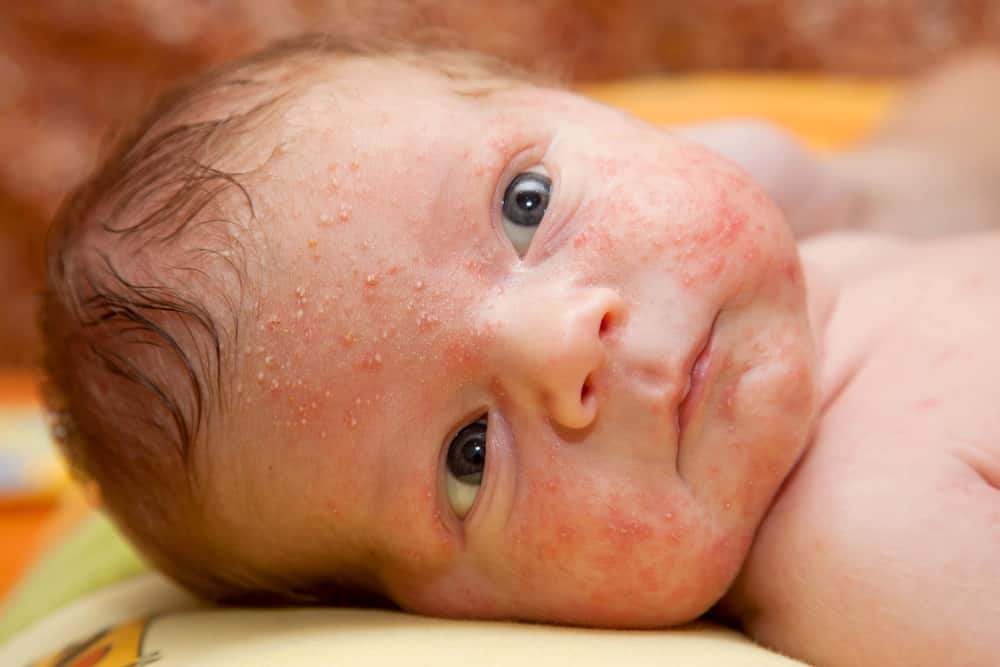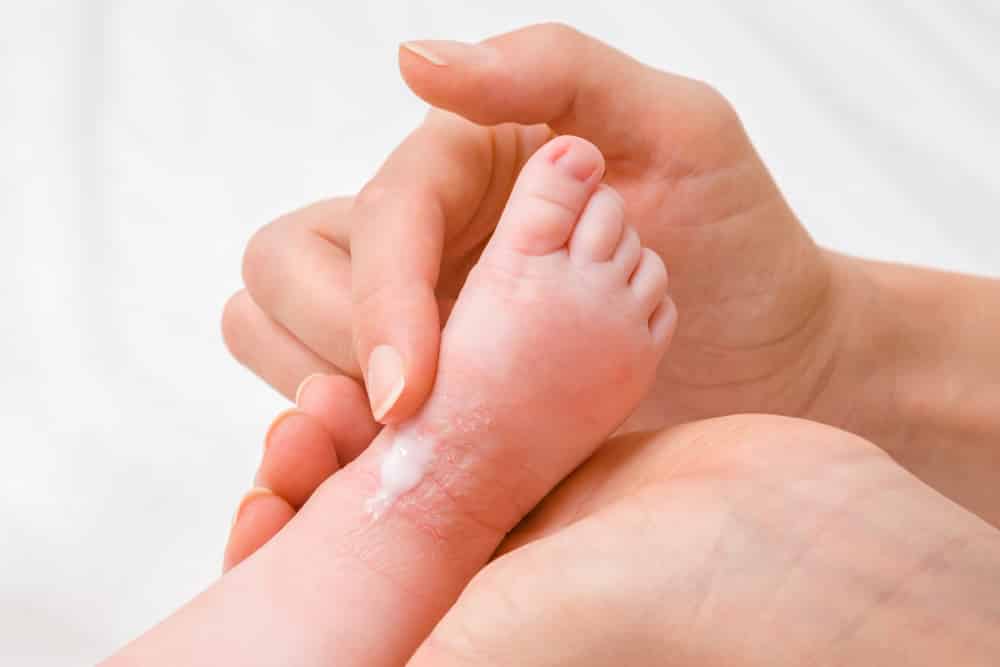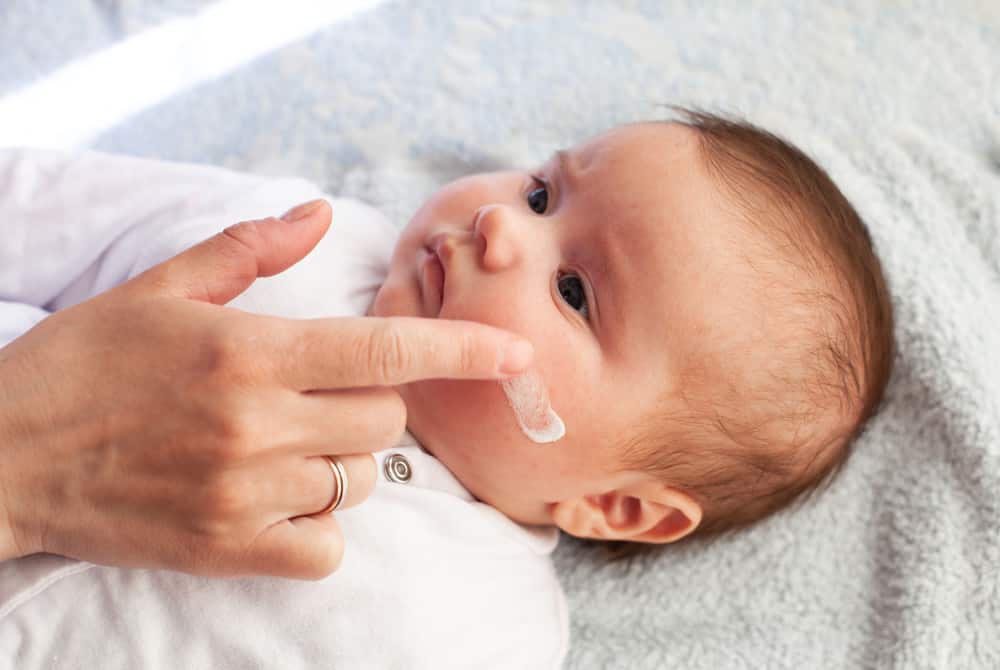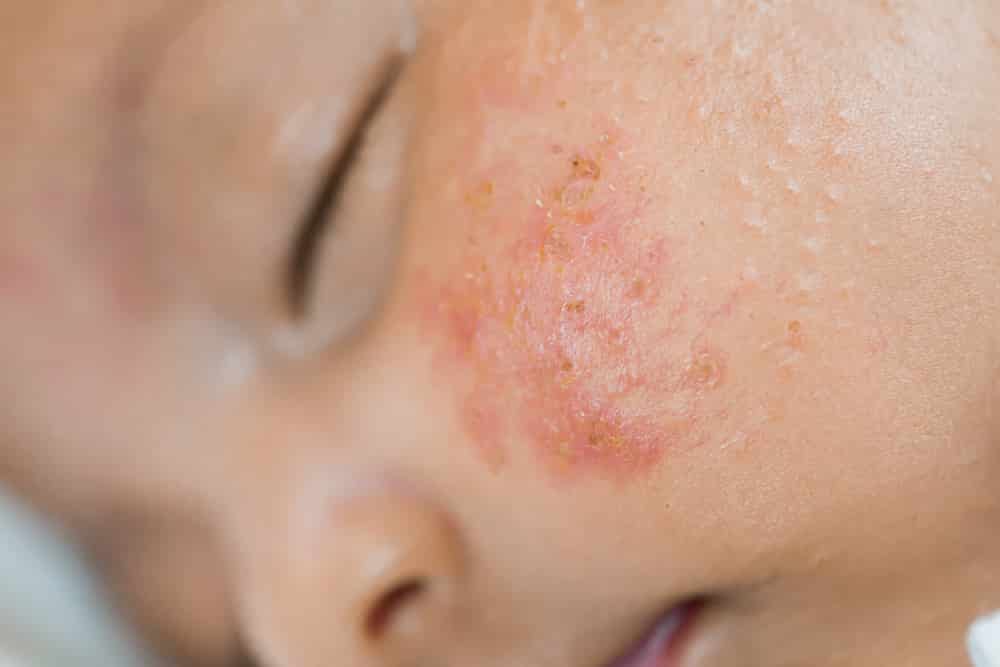Your baby’s skin is very delicate. As a result, it’s not uncommon to find rashes or minor blemishes on your little one’s skin in the early stages of life. Although this may be slightly disturbing, doctors insist that most skin conditions like acne or eczema in babies usually resolve with time.

Yes, we know that noticing a bump, rash or any other blemish on your baby’s skin may be scary. However, what really matters is knowing what condition it is and how it differs from other common skin problems in babies. For example, it may be really difficult to differentiate between eczema and baby acne.
If you’re in these shoes, you’re at the right place!
In this article, you’d find everything you need to know about these really similar baby skin conditions; the causes, symptoms, similarities, and most importantly, how to tell the difference.
Read on to learn more!
Table of contents
Eczema In Babies
Eczema is also called Atopic Dermatitis in medical lingo.
It is a skin condition characterized by highly sensitive and irritable skin. Eczema can be seen in babies older than six months. In most cases, it is genetic and can be passed from parent to child. Like many other infections of the skin, eczema may take certain ‘off-seasons’, where none of the symptoms are observable.
When it does appear, it may be caused by any of the following factors:
- Stress
- Infections
- Extreme heat/cold
- Humidity
- Irritants
- Allergens

Common irritants that may cause eczema in babies are:
- Harsh bathing soaps
- Strong fragrances
- Harsh detergents
- Toxic chemicals
- Smoke
- Wool
- Synthetic fabrics
- Sweat
Recent medical research has even shown that eczema can also be associated with food allergies and abrupt changes in feeding techniques or routines. As a result, it is really important to ensure that your baby is on the right diet at every stage of his/her development.
Click here to learn more about the all-important baby food stages.
How To Recognize Eczema On Your Baby’s Skin
It’s a really simple task.
First, it is important to note that eczema often appears as a dry, red patch of skin. In most cases, this patch is very itchy and can go on to become infected. Sometimes, the itchiness may become more serious at night, thereby affecting your baby’s sleep. These rashes can be found on your baby’s face, scalp, cheeks, or arms.
Other obvious symptoms of eczema in babies include:
- Dry scaly skin
- Rash that oozes out clear fluid
- Cracked flaky skin
- Skin creases on the palms of the hand or under the eye
- Darkening of the skin around the eyes
How To Treat Eczema In Babies
The aim of eczema treatment is to reduce the number of flares (the dark red patches) and increase the disease-free periods.

The following tips would help you treat eczema on your baby’s skin:
1. Adequate skin hydration
This can be achieved by;
- Giving a daily lukewarm bath and applying mild baby skincare products like coconut oil to retain the moisture in your baby’s skin.
- Avoiding alchol based creams or lotions
- Using a mild non soap cleanser during your baby’s bath sessions.
2. Identify and avoid triggers
If you can, figure out what irritates your baby’s skin and try to remove it. Sometimes, it can be as obvious as your dog’s fur or as innocuous as an ornamental plant. Nevertheless, removing the irritant is a sure way to manage eczema in babies.
3. Pick The Right Clothes
Dress your baby in clothing made from 100% cotton or other natural fabrics that are safer for babies. This is really helpful because these products are comfy, warm enough, and less likely to irritate your little one’s skin.
4. Speak With Your Pediatrician
In the event of a flare, kindly contact your health care provider. Your doctor may prescribe drugs like topical steroids to reduce inflammation and itching.
Baby Acne
On the other hand, baby acne is a temporary skin condition that affects newborns. Most times, baby acne arises at about the second or third week of life. Although the cause is not known, this condition is really common amongst babies of this age group.

1. How To Identify Baby Acne
Baby acne is usually present with small red or white bumps on your baby’s cheeks, nose, and forehead. These bumps sometimes can be filled with a whitish substance. In contrast to eczema, baby acne does not itch or get infected.
2. How To Treat Baby acne
Sadly, there’s little you can do to prevent baby acne.
When it occurs, it simply runs its course and disappears without leaving any scar on your baby’s skin. However, it is important to note that the duration of baby acne varies for every child. While you wait for your baby’s acne to resolve, you can apply the following tips to protect your child’s skin:
- Keep his/her face clean
- Avoid harsh skincare products
- Wash your baby’s skin with lukewarm water
- Don’t squeeze, rub or scrub off the acne as this will only irritate your baby’s skin and may worsen the problem
Conclusion
Finally, it is important to keep in mind that your baby needs some time to adjust to this whole new world. In this period, it is not strange for his/her skin to react to the changes in various ways. When this happens, you don’t need to worry, all you have to do is follow the tips mentioned in this article and everything would work out.
Your baby is going to be just fine!
References
Eichenfield LF, Krakowski AC, Piggott C, Del Rosso J, Baldwin H, Friedlander SF, Levy M, Lucky A, Mancini AJ, Orlow SJ, Yan AC, Vaux KK, Webster G, Zaenglein AL, Thiboutot DM; American Acne and Rosacea Society. Evidence-based recommendations for the diagnosis and treatment of pediatric acne. Pediatrics. 2013 May;131 Suppl 3:S163-86. doi: 10.1542/peds.2013-0490B. PMID: 23637225.
Ashton R, Weinstein M. Acne Vulgaris in the Pediatric Patient. Pediatr Rev. 2019 Nov;40(11):577-589. doi: 10.1542/pir.2018-0137. PMID: 31676531.
Chalmers JR, Haines RH, Bradshaw LE, Montgomery AA, Thomas KS, Brown SJ, Ridd MJ, Lawton S, Simpson EL, Cork MJ, Sach TH, Flohr C, Mitchell EJ, Swinden R, Tarr S, Davies-Jones S, Jay N, Kelleher MM, Perkin MR, Boyle RJ, Williams HC; BEEP study team. Daily emollient during infancy for prevention of eczema: the BEEP randomised controlled trial. Lancet. 2020 Mar 21;395(10228):962-972. doi: 10.1016/S0140-6736(19)32984-8. Epub 2020 Feb 19. PMID: 32087126; PMCID: PMC7086156.
Waserman S. Doctor, can we prevent food allergy and eczema in our baby? Curr Opin Allergy Clin Immunol. 2016 Jun;16(3):265-71. doi: 10.1097/ACI.0000000000000267. PMID: 27057796.

